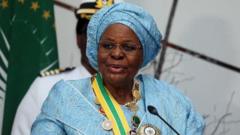In a surprising outcome amidst a wave of political changes across southern Africa, Namibia has elected its first female president, Netumbo Nandi-Ndaitwah, while the ruling South West Africa People’s Organization retains control of the parliament despite a decrease in seats, reflecting public dissatisfaction.
Namibia Makes History with Election of First Female President

Namibia Makes History with Election of First Female President
Netumbo Nandi-Ndaitwah's election marks a significant moment in Namibia's political landscape and highlights the continuing influence of the ruling SWAPO party amidst broader regional political shifts.
In an unexpected twist in southern African politics, Namibia’s governing party, the South West Africa People’s Organization (SWAPO), has maintained its hold on power during recent elections, while simultaneously making history by electing its first female president, Netumbo Nandi-Ndaitwah. The election results, announced by the electoral commission, indicate Nandi-Ndaitwah secured 57.31 percent of the presidential vote, putting her at the helm of the mineral-rich nation.
Nandi-Ndaitwah, 72, previously served as deputy prime minister and minister of international relations and cooperation under President Hage G. Geingob, who passed away in February. Following his death, an interim president was appointed but did not contest in the elections. Her victory places her among a select group of women who lead nations in Africa, a region where female leadership has been historically rare.
While SWAPO celebrated Nandi-Ndaitwah's win, the party experienced a reduction in parliamentary seats, securing 51 out of 96, down from 63 in the last election in 2019. This decrease indicates potential voter discontent regarding the nation's stagnant economy and aligns with a regional trend where long-standing political parties face opposition. The Independent Patriots for Change, led by former SWAPO members like Panduleni Itula, emerged as a significant force, winning 20 seats and reflecting the growing fragmentation of political power in Namibia.
Despite these challenges, SWAPO remains a dominant player in Namibia’s political scene, and Nandi-Ndaitwah's presidency could pave the way for continued governance amidst calls for economic improvement and social reforms.






















